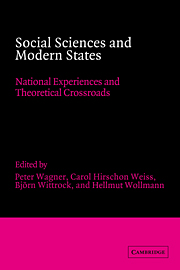Book contents
- Frontmatter
- Contents
- Acknowledgements
- Notes on contributors
- Part I National experiences in comparative perspective
- 1 The policy orientation: legacy and promise
- 2 Social science and the modern state: policy knowledge and political institutions in Western Europe and the United States
- 3 Political events and the policy sciences
- 4 From policy analysis to political management? An outside look at public-policy training in the United States
- 5 Networks of influence: the social sciences in the United Kingdom since the war
- 6 National contexts for the development of social-policy research: British and American research on poverty and social welfare compared
- 7 Political culture and the policy orientation in Dutch social science
- 8 Arenas of interaction: social science and public policy in Switzerland
- 9 The influence of social sciences on political decisions in Poland
- 10 The impact of social sciences on the process of development in Japan
- 11 Changing roles of new knowledge: research institutions and societal transformations in Brazil
- Part II Policy sciences at the crossroads
- Part III Epilogue
- Index
11 - Changing roles of new knowledge: research institutions and societal transformations in Brazil
Published online by Cambridge University Press: 05 February 2012
- Frontmatter
- Contents
- Acknowledgements
- Notes on contributors
- Part I National experiences in comparative perspective
- 1 The policy orientation: legacy and promise
- 2 Social science and the modern state: policy knowledge and political institutions in Western Europe and the United States
- 3 Political events and the policy sciences
- 4 From policy analysis to political management? An outside look at public-policy training in the United States
- 5 Networks of influence: the social sciences in the United Kingdom since the war
- 6 National contexts for the development of social-policy research: British and American research on poverty and social welfare compared
- 7 Political culture and the policy orientation in Dutch social science
- 8 Arenas of interaction: social science and public policy in Switzerland
- 9 The influence of social sciences on political decisions in Poland
- 10 The impact of social sciences on the process of development in Japan
- 11 Changing roles of new knowledge: research institutions and societal transformations in Brazil
- Part II Policy sciences at the crossroads
- Part III Epilogue
- Index
Summary
NEW KNOWLEDGE AND SOCIAL REFORM
Intellectuals have always sought to influence their societies. Priests, literati, and lawyers competed for centuries with warlords, princes, and noblemen for positions of prestige, authority, and decision. They also fought among themselves. The arrangements resulting from these disputes describe, in broad terms, the value content and orientations of past and present civilizations (Weber, 1968, is largely an attempt to look at civilizations from this standpoint). Modern times brought to this arena a new type of intellectual, who claims to have the definite credential for his power aspirations: the new knowledge, buttressed by the certitudes of science. In Western Europe, the new intellectuals were part of broad social movements that did away with much of the traditional order and brought about the modern world. Because of this association, the values of empirical knowledge, the use of reason, individual freedom, social justice, and the conquest of nature appeared to come together. They were all modern and progressive. (For the links between modern science and rising social sectors, see Ben-David, 1971.)
The proponents of the rationalist faith had to fight the intellectuals of the old type for the supremacy of their own natural philosophy and had to prove to power holders and emerging groups how valuable science could be to them. The powers of science have been traditionally argued for in two ways. The first belongs to the stream of thought of modern economic and political liberalism.
- Type
- Chapter
- Information
- Social Sciences and Modern StatesNational Experiences and Theoretical Crossroads, pp. 230 - 260Publisher: Cambridge University PressPrint publication year: 1991
- 1
- Cited by



